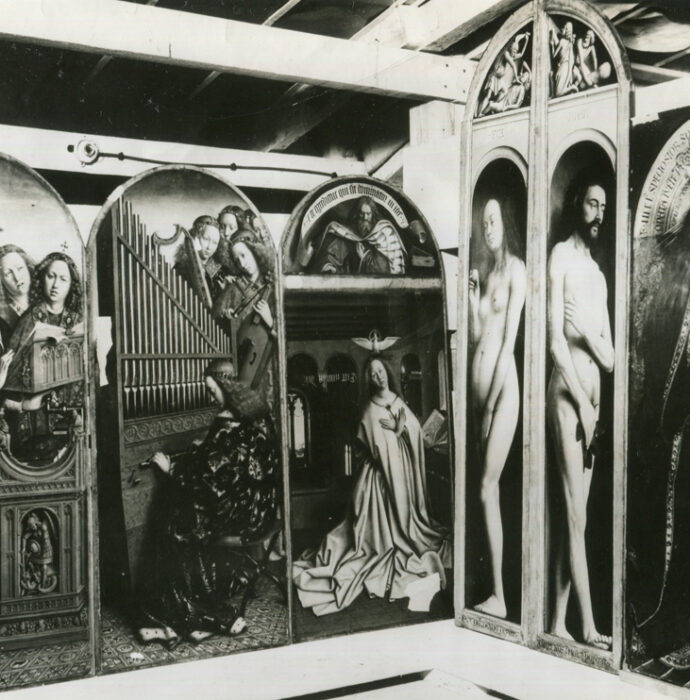

ACLS created the committee that became the research engine of the Commission for Preservation of Cultural Treasures in War Areas, made famous decades later in the film Monuments Men.
The famous Ghent Altarpiece of St. Bavo Cathedral.
In January 1943, as the destruction of World War II spread across Europe, North Africa, and Asia, the American Council of Learned Societies established the ACLS Committee on the Protection of Cultural Treasures in War Areas. The committee marshaled the combined scholarly expertise of ACLS’s membership to guide the Allied Forces in the protection and recovery of art, monuments, and other treasured cultural heritage threatened by the ongoing conflict.
Equipped with ACLS-produced maps, guides, and manuals for the care of cultural artifacts, intrepid teams of armed forces personnel—the now celebrated Monuments Men—tracked down hundreds of pieces of art and other artifacts purloined by Nazi forces, such as the famous Ghent Altarpiece of St. Bavo Cathedral.


ACLS created the committee that became the research engine of the Commission for Preservation of Cultural Treasures in War Areas, made famous decades later in the film Monuments Men.
The famous Ghent Altarpiece of St. Bavo Cathedral.
ACLS reacted quickly to the destructive events of WWII because so much of our cultural heritage is fragile and demands protection, a fact that is just as true now as it was in the 1940s. Today, through our support of rigorous research in the humanities and social sciences, ACLS helps scholars build the knowledge and expertise necessary to understand and preserve the cultures and cultural property endangered by ongoing conflicts around the world. Programs focused on digital scholarship have allowed scholars to build tools that facilitate the mapping and recovery of artifacts in the field, and Mellon/ACLS Public Fellows have contributed their time and talents to agencies working in conflict zones around the world, such as the State Department’s Bureau of Conflict and Stabilization Operations.
The sites of conflict in the world change from decade to decade, a sad reality that underscores the need for cultural knowledge that is as broad as it is deep. As one of the leading representatives of humanities scholarship in the United States, ACLS continues to advance the types of learning that help us understand and preserve the vibrant histories, languages, and visual cultures that otherwise could fall victim to the destruction of war.